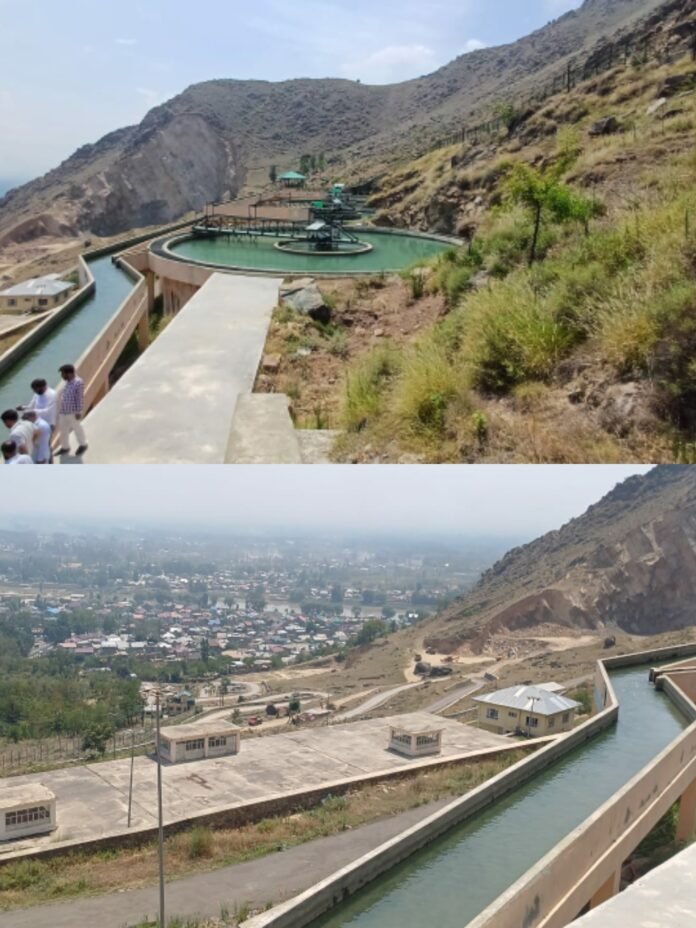Mohsina Yaseen
Srinagar, INB, 13-Aug: Kashmir is grappling with a severe water crisis, and the water filtration plants are struggling to keep up with the growing demand for clean drinking water. The crisis has been exacerbated by soaring temperatures and dwindling water resources, putting immense pressure on these facilities.
Three major water filtration plants—Tangnar, Pukhribal, and Rangil—are operating at full capacity to supply millions of gallons of water daily to the region’s inhabitants. However, concerns have been raised about the quality of water being supplied, with some residents alleging that the extreme heat has led to issues in water purification and quality.
Officials have dismissed these allegations, stating that all standards are being strictly adhered to and that daily tests are conducted to ensure the purity and quality of water. The plants employ multi-stage testing, filtration, and treatment processes to remove impurities and contaminants, including chlorination and activated carbon chambers.
Despite these measures, the question remains: Can these facilities keep pace with Kashmir’s increasing thirst? The region’s population is growing, and the demand for clean drinking water is rising. The water filtration plants are working overtime to meet this demand, but the strain is beginning to show.
For 35-year-old Fatima, a resident of Srinagar’s Hathi Khan area, the water crisis has become a daily struggle. She wakes up at 5 a.m. every day to fill up water containers for her family’s needs, often going without water for hours. Her children are already suffering from water-borne illnesses, and she worries about their health.
The Pukhribal Filtration Plant, which supplies water to Fatima’s neighborhood and areas around “Makhdum Sahib and Hari Parbat,” including Hathi Khan, Ashraf Khan, Hakah Bazaar, Badamwari, Devi Angan, Bachhi Darwaza, Mahalla Mum Khan, and Inner Kathi Darwaza, is operating at full capacity.
“We are doing our best to provide clean drinking water to the public, but the demand is increasing day by day,” said Umi Farwah, Assistant Executive Engineer of the plant. “We are using activated carbon chambers and chlorination to remove impurities and contaminants from the water.”
The Rangil Filtration Plant, which supplies water to densely populated areas from Ganderbal to Maloora, including Lal Bazar, Soura Budhpora, Hawal, Rajouri Kadal, Bohri Kadal, Gojwara, Nowhatta, Khanyar, Gol Market, Karan Nagar, Safakadal, Batmaloo, Pandach, and Maloora HMT, is also facing similar challenges.
“We are working overtime to meet the demand, but it’s a challenging task,” said Javid Ahmed, Assistant Executive Engineer of the plant.
The Tangnar Filtration Plant, located near Pantha Chowk, has a capacity of 2.4×4 MGD and consists of six chambers.
According to Javid Ahmed, Assistant Executive Engineer of Sub Division Tangnar, the plant supplies approximately 10 million gallons of water daily. The water from the Jhelum River is treated at the plant, which has undergone rigorous testing and multiple stages of purification.
“We are ensuring that all standards are strictly adhered to and daily tests are conducted to ensure the purity and quality of water,” said Peerzada Shaiq, Executive Engineer of the Master Plan. “We are also exploring new sources of water and upgrading our treatment processes to meet the growing demand.”
Despite the efforts of the filtration plants, the water crisis persists. The situation highlights the critical role of water filtration plants in Kashmir’s water crisis. These facilities are the lifeline of the region, providing clean drinking water to millions of people. However, they are struggling to keep up with the growing demand, and the government needs to take urgent action to address the underlying causes of the crisis.
In addition to the challenges faced by the filtration plants, the valley is also struggling with aging infrastructure, inadequate water supply, contamination of water sources, and lack of funding for maintenance and upgrades.
As the water crisis continues to affect the lives of millions in Kashmir, it is essential that the government takes immediate action to address the issue. Upgrading the filtration plants, improving the water supply infrastructure, and addressing the underlying causes of the crisis are crucial steps towards ensuring clean drinking water for all residents.
Fatima and her family, like many others in Kashmir, are waiting for a solution to the water crisis. They deserve access to clean drinking water, and it is the responsibility of the government to ensure that they get it.

